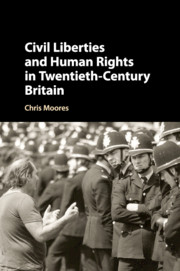Book contents
- Civil Liberties and Human Rights in Twentieth-Century Britain
- Civil Liberties and Human Rights in Twentieth-Century Britain
- Copyright page
- Dedication
- Contents
- Figures
- Tables
- Acknowledgements
- Abbreviations
- Introduction
- Part I Civil Liberties in the Age of the Popular Front
- Part II Civil Liberties, a Rights Revolution and New Social Movements
- 3 The Progressive Professionals: Civil Liberties and the Politics of Activism in the 1960s
- 4 From Progressive to Radical: The 1970s and a Crisis of Civil Liberties
- Part III NGOs and the Consolidation of Human Rights
- Bibliography
- Index
3 - The Progressive Professionals: Civil Liberties and the Politics of Activism in the 1960s
from Part II - Civil Liberties, a Rights Revolution and New Social Movements
Published online by Cambridge University Press: 31 March 2017
- Civil Liberties and Human Rights in Twentieth-Century Britain
- Civil Liberties and Human Rights in Twentieth-Century Britain
- Copyright page
- Dedication
- Contents
- Figures
- Tables
- Acknowledgements
- Abbreviations
- Introduction
- Part I Civil Liberties in the Age of the Popular Front
- Part II Civil Liberties, a Rights Revolution and New Social Movements
- 3 The Progressive Professionals: Civil Liberties and the Politics of Activism in the 1960s
- 4 From Progressive to Radical: The 1970s and a Crisis of Civil Liberties
- Part III NGOs and the Consolidation of Human Rights
- Bibliography
- Index
Summary
- Type
- Chapter
- Information
- Civil Liberties and Human Rights in Twentieth-Century Britain , pp. 105 - 143Publisher: Cambridge University PressPrint publication year: 2017



